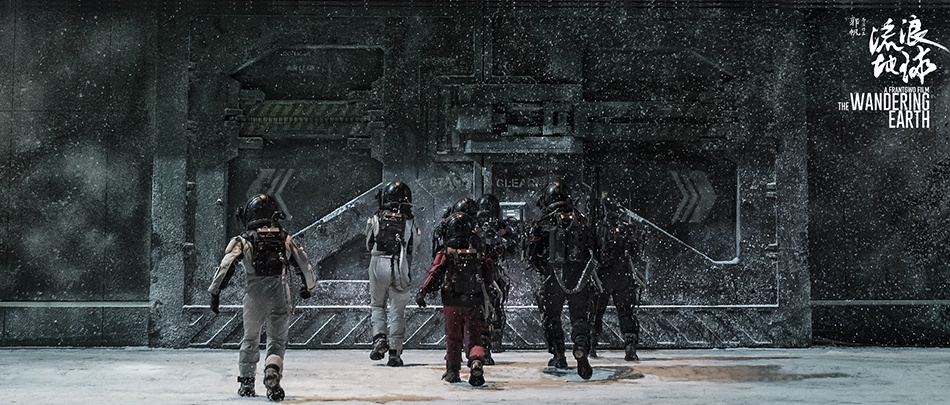There seems to be a yearning for sci-fi about space travel amongst the Chinese movie-going audience. I could make baseless assumptions about why, like how censorship laws prevent any fantasy genre that isn’t based on Chinese myth from gaining a foothold, or how cyberpunk can’t thrive because in order for it to be anything more than an aesthetic there needs to be some kind of critique, usually of the society the work was written in.
But honestly, my money is on a far simpler reason, a reason that was touched upon in the movie itself:
In China, in cities like Beijing, where most people live, you can’t see the stars.
The Wandering Earth is China’s first big-budget interstellar spectacular. It’s an adaptation of a short story by multi award winning sci-fi writer Liu Cunxin (best known for The Three Body Problem) and starring Wu Jing (director and star of both Wolf Warriors), and with such a pedigree, it’s got a lot to live up to.
It’s the future, and our sun is dying. It’s about to expand so large that it will consume everything in its path.
So, the world decides to come together to build enormous planetary thrusters to move our planet to a new sun. This trip is set to take twenty-five hundred years, so the people of the Earth have a lot of waiting to do.
The last Chinese movie I watched was Operation Red Sea, a film that was essentially propaganda extolling the might of the CCP, and I expected something along those same lines in The Wandering Earth, but I was wrong. I was wrong about a lot of things going into this film, and I expect this will be a common occurrence for many audiences.
Those of you expecting a cerebral sci-fi romp exploring the science behind the planetary thrusters will be disappointed.
It’s not about the science. The Wandering Earth is far more concerned with its characters, and on its themes of mutual co-operation, stepping aside and entrusting our future to the next generation, and hope.
Regarding those characters, they’re all kind of broad, with only a few main character ticks distinguishing them. You’ve got Liu Qi (Qu Chuxiao), an angry boy with a chip on his shoulder caused by his daddy issues, said father, Liu Peiqiang (Wu Jing), a scientist on a space station who hasn’t seen his family in ten years, Wang Lei (Guangjie Li), a gruff, no nonsense soldier captain who comes into conflict with our plucky young hero, and Han Duoduo (Zhao Jinmai), an innocent, doe-eyed high school kid whose hopeful words inspires the world to gamble everything they have on a million-to-one shot of success. Unfortunately, those characters are really the only ones to get that level of characterization.
The others can only be reduced to phrases like “comic relief foreigner,” “the lady soldier” and “the guy who tries to shoot Jupiter with a minigun”. But, in such a melodramatic, high-concept, irony-free movie such as this, these characters enrich the narrative, becoming broad, mythic archetypes that elevate this film to almost operatic levels.
You could honestly turn The Wandering Earth into epic poetry, or a proper opera, and it would feel right at home.
Visually, the movie is stunning, capturing the enormity of the stellar environments wonderfully. You can feel just how enormous the world engines are, but those are dwarfed by the size of the Earth, and then the Earth goes on to be dwarfed by Jupiter when it does a fly by. It’s not all great. Certain CGI scenes look kind of silly, and there are moments where there’s obvious green-screen, but those are few and far in between. There are also many practical effects in this movie, and those are uniformly great.
My favourite would have to be the exoskeletons that the soldiers wear, which have some great sound design that really make you feel every creak of the servos.
However, this isn’t a flawless movie. There are some aspects that don’t really work. Certain character conflicts come out of nowhere and are resolved just as quickly before being forgotten entirely.
Dramatic story beats aren’t expressed clearly, leaving you confused as to what happened during the climax of the movie. Certain themes are expressed in probably the most didactic manner possible before then being dropped like a sack of bricks, and the actual end of the movie goes on for two climaxes too many.
But the main problem with this movie is that it won’t be what you expected, and you need to be 100% on-board with what it actually is. The movie doesn’t care if you can outsmart it with your PhD in astrophysics, or your near-pedantic attention to detail. That’s because The Wandering Earth isn’t telling a story with its brain, but its heart. It’s about big emotions, big set pieces that take your breath away, and a movie that comes together to deliver one of the most optimistic stories I’ve experienced in a very long time.







